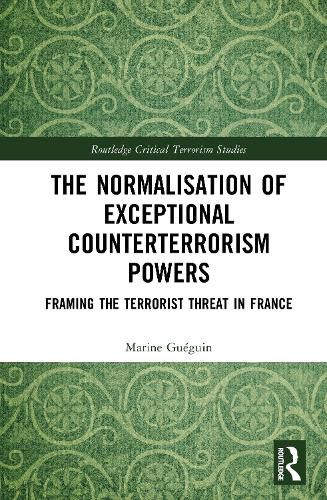Readings Newsletter
Become a Readings Member to make your shopping experience even easier.
Sign in or sign up for free!
You’re not far away from qualifying for FREE standard shipping within Australia
You’ve qualified for FREE standard shipping within Australia
The cart is loading…






This book investigates the framing of the terrorist threat in France from 2015 to 2020 as an 'exceptional' challenge which requires a 'special' public security response.
The book examines how French political actors framed the terrorist threat in French political discourse from an exceptional challenge to a permanent, routine threat. It provides an in-depth critical discourse analysis of the French political narratives surrounding the activation of the 'etat d'urgence' (state of emergency) following the 2015 Charlie Hebdo and Paris terrorist attacks, and traces this narrative until 2020. The study explores the securitisation-desecuritisation framework, showing how the normalisation of emergency powers reflects the ongoing (re)construction of terrorism within French political contexts. The work demonstrates the importance of threat framing and the securitisation of terrorism by considering the colonial legacies embedded in French counterterrorism (CT) policies. By investigating the intersection of CT political discourse, temporality, and colonial continuity, the book challenges traditional notions of exceptionalism in securitisation. It argues that the routinisation of counterterrorism measures highlights the impossibility of fully desecuritising terrorism (re-establishing the status quo), revealing how these measures are deeply rooted in France's colonial past.
This book will be of interest to students of terrorism studies, critical security studies, French politics and International Relations.
$9.00 standard shipping within Australia
FREE standard shipping within Australia for orders over $100.00
Express & International shipping calculated at checkout
This book investigates the framing of the terrorist threat in France from 2015 to 2020 as an 'exceptional' challenge which requires a 'special' public security response.
The book examines how French political actors framed the terrorist threat in French political discourse from an exceptional challenge to a permanent, routine threat. It provides an in-depth critical discourse analysis of the French political narratives surrounding the activation of the 'etat d'urgence' (state of emergency) following the 2015 Charlie Hebdo and Paris terrorist attacks, and traces this narrative until 2020. The study explores the securitisation-desecuritisation framework, showing how the normalisation of emergency powers reflects the ongoing (re)construction of terrorism within French political contexts. The work demonstrates the importance of threat framing and the securitisation of terrorism by considering the colonial legacies embedded in French counterterrorism (CT) policies. By investigating the intersection of CT political discourse, temporality, and colonial continuity, the book challenges traditional notions of exceptionalism in securitisation. It argues that the routinisation of counterterrorism measures highlights the impossibility of fully desecuritising terrorism (re-establishing the status quo), revealing how these measures are deeply rooted in France's colonial past.
This book will be of interest to students of terrorism studies, critical security studies, French politics and International Relations.